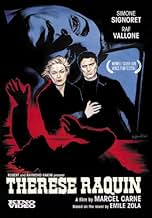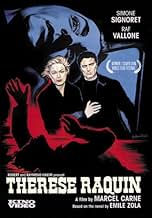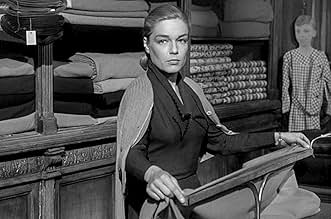VALUTAZIONE IMDb
7,4/10
2029
LA TUA VALUTAZIONE
Un camionista uccide il marito della donna che ama e diventa l'oggetto di minacce.Un camionista uccide il marito della donna che ama e diventa l'oggetto di minacce.Un camionista uccide il marito della donna che ama e diventa l'oggetto di minacce.
- Regia
- Sceneggiatura
- Star
- Premi
- 2 vittorie e 2 candidature totali
Martial Rèbe
- Grivet
- (as Martial Rebe)
Francette Vernillat
- Françoise, la bossue
- (as Françoise Vernillat)
Madeleine Barbulée
- Madame Noblet, une cliente
- (as Madeleine Barbulé)
Recensioni in evidenza
'Thérèse Raquin' (1953) (English title - 'The Adultress') is Marcel Carné's third post-Prévert film. Connoisseur film fans consider it his latest remarkable film. It was produced by the famous Hakim brothers. Even though Jacques Prévert no longer wrote his screenplays and dialogues, Marcel Carné did not give up good literature for this film, and took as inspiration the novel 'Thérèse Raquin', Émile Zola's first great success, a story about passion, crime and punishment in France in the second half of the 19th century. From Zola's (suspenseful in my opinion) story of guilty love and remorse, this adaptation turns into a thriller with elements of film noir. Still suspenseful, of course, but in a completely different genre. It's not a bad movie, but it's a different movie, different from Zola and different from other Marcel Carné movies.
We learn about Therese's fate from dialogues, quite late in the film. The story begins when she is already unhappily married to her cousin Camille, a hypochondriac feeble man caressed by her mother (played by an exceptionally well-composed actress named Sylvie), who terrorizes his young wife. Frustrated from all points of view, Therese seeks refuge in a love affair with a trucker dressed in a leather jacket played by Raf Vallone. The passion of the two inevitably leads to murder, and the murder leads to complications when they are blackmailed by an unexpected witness. It can be said that the film is built of two distinct parts separated by the crime itself committed on the train (here we are dealing again with a change of place, in the novel the deed takes place on water): in the first we witness the suffocating atmosphere in the house the bourgeois family, which builds the premises of the violent act and in the second we follow the consequences of the act filmed in thriller style.
The production is uneven, but it has some beautiful cinematic moments. Simone Signoret is gorgeous both physically and as an actress. Most of us know her from her mature roles and after that - here she is young and fascinating, with eyes whose deep blue we 'see' even though it is a black and white film. The scene of the confrontation with the tyrannical mother-in-law, played only by eyesights (her mother-in-law was paralyzed) is intense and memorable. Raf Vallone, however, is not, in my opinion, up to his partner. The psychological shortcuts of the plot are not sufficiently offset by the elements of suspense in the second part of the film. Paradoxically, Marcel Carné seems more at ease when filming outside, on the streets of post-war Lyon or on the banks of the Rhône. The director, who was to be pushed aside by the younger newcomers of Nouvelle Vague and included in the category of 'cinema du papa', shows that he mastered a few years before them mobility of the camera, framing of the characters on the streets or in nature and direct sound recording. 'Thérèse Raquin' is an interesting film that deserves to be watched or re-watched as a cinematic document, for Simone Signoret, and as a more than acceptable thriller noir. Less, perhaps, for Zola's novel that inspired it.
We learn about Therese's fate from dialogues, quite late in the film. The story begins when she is already unhappily married to her cousin Camille, a hypochondriac feeble man caressed by her mother (played by an exceptionally well-composed actress named Sylvie), who terrorizes his young wife. Frustrated from all points of view, Therese seeks refuge in a love affair with a trucker dressed in a leather jacket played by Raf Vallone. The passion of the two inevitably leads to murder, and the murder leads to complications when they are blackmailed by an unexpected witness. It can be said that the film is built of two distinct parts separated by the crime itself committed on the train (here we are dealing again with a change of place, in the novel the deed takes place on water): in the first we witness the suffocating atmosphere in the house the bourgeois family, which builds the premises of the violent act and in the second we follow the consequences of the act filmed in thriller style.
The production is uneven, but it has some beautiful cinematic moments. Simone Signoret is gorgeous both physically and as an actress. Most of us know her from her mature roles and after that - here she is young and fascinating, with eyes whose deep blue we 'see' even though it is a black and white film. The scene of the confrontation with the tyrannical mother-in-law, played only by eyesights (her mother-in-law was paralyzed) is intense and memorable. Raf Vallone, however, is not, in my opinion, up to his partner. The psychological shortcuts of the plot are not sufficiently offset by the elements of suspense in the second part of the film. Paradoxically, Marcel Carné seems more at ease when filming outside, on the streets of post-war Lyon or on the banks of the Rhône. The director, who was to be pushed aside by the younger newcomers of Nouvelle Vague and included in the category of 'cinema du papa', shows that he mastered a few years before them mobility of the camera, framing of the characters on the streets or in nature and direct sound recording. 'Thérèse Raquin' is an interesting film that deserves to be watched or re-watched as a cinematic document, for Simone Signoret, and as a more than acceptable thriller noir. Less, perhaps, for Zola's novel that inspired it.
Thérèse Raquin (AKA: The Adultress) is directed by Marcel Carné and Carné co-adapts the screenplay with Charles Spaak from the Émile Zola novel. It stars Simone Signoret, Raf Vallone, Jacques Duby, Maria Pia Casilio and Roland Lesaffre. Music is by Maurice Thiriet and cinematography by Roger Hubert.
Carné reworks Zola's novel to be set in post-war Lyon and slips into a film noir gear. Plot essentially finds Signoret as Raquin, a severely repressed woman stuck in a marriage to her wimpy weasel of a cousin, not only that but she also has to share a home with his domineering mother. Then one day the strapping Laurent LeClaire (Vallone) enters her life, sparking a fiery affair, but as plans for the future are plotted, a turn of events drastically changes everything.
The characterisations are strongly performed, the five principals (Lesaffre arrives late in the play as a key character) giving performances that really draw you into their respective worlds, for better or worse as regards the human condition. Carné skillfully blends the beautiful side of Lyon, such as the quaint cobbled streets and the River Rhone, with a dull bleakness that fogs Thérèse, a woman who has forgotten how to smile, sexual fulfilment a non entity. Hubert also brings his photographic skills to the show, providing some blisteringly gorgeous night shots that offer hope for the new found lovers. But there is a sign post up ahead and it says that the next stop is noirville, and after having spent half the film building his characters, Carné dashes hope and replaces it with misery. Fate plays a big part in the crux aspects of the film, a film noir staple of course, right up to the clinical finale that comes with a thunderous fait accompli.
It's a bit draggy in parts as the director is at pains to show the humdrum side of life, but the change of gear at the mid-point - and the brilliant last quarter, make this a worthy addition for collectors of Frenchie noir. 8/10
Carné reworks Zola's novel to be set in post-war Lyon and slips into a film noir gear. Plot essentially finds Signoret as Raquin, a severely repressed woman stuck in a marriage to her wimpy weasel of a cousin, not only that but she also has to share a home with his domineering mother. Then one day the strapping Laurent LeClaire (Vallone) enters her life, sparking a fiery affair, but as plans for the future are plotted, a turn of events drastically changes everything.
The characterisations are strongly performed, the five principals (Lesaffre arrives late in the play as a key character) giving performances that really draw you into their respective worlds, for better or worse as regards the human condition. Carné skillfully blends the beautiful side of Lyon, such as the quaint cobbled streets and the River Rhone, with a dull bleakness that fogs Thérèse, a woman who has forgotten how to smile, sexual fulfilment a non entity. Hubert also brings his photographic skills to the show, providing some blisteringly gorgeous night shots that offer hope for the new found lovers. But there is a sign post up ahead and it says that the next stop is noirville, and after having spent half the film building his characters, Carné dashes hope and replaces it with misery. Fate plays a big part in the crux aspects of the film, a film noir staple of course, right up to the clinical finale that comes with a thunderous fait accompli.
It's a bit draggy in parts as the director is at pains to show the humdrum side of life, but the change of gear at the mid-point - and the brilliant last quarter, make this a worthy addition for collectors of Frenchie noir. 8/10
Not the best of Marcel Carne by any means but an intelligent, measured if somewhat conventional screen version of Zola's novel, nevertheless. Simone Signoret is "Therese Raquin", the married woman whose affair with truck-driver Raf Vallone leads to murder and blackmail. She is, of course, excellent but this is Vallone's movie; it is an effortless performance of an ordinary man caught up in events over which he has no real control. It's also superbly shot in Lyon by Roger Hubert and the updating to postwar France fits the plot perfectly. In an American setting this could be by James M. Cain though the climatic twist is neater than anything Cain might have given us.
People generally think that Carné's heyday comes to an end with "les portes de la nuit" (1946)And it's sure that- whatever the new wave's view on the matter-these thirties and forties movies are among the very best French cinema gave to the world("le jour se lève" "quai des brumes""les enfants du paradis" and "hôtel du nord" ,to name but four are the crème de la crème ,easily equalling the best of Renoir)One always tries to minimize Carné's importance,mentioning the actors (Gabin,Arletty,Simon,et al)and Jacques Prévert's screen plays.One often forgets that Carné did direct these masterworks and he always chose the right actors,decorators(Alexandre Trauner who was to work in Hollywood later),musicians,with mind-boggling results.
"Therese Raquin" (1953)came before the new wave but Carné 's credibility was sinking fast and he was given the coup de grace by his young "nouvelle vague" colleagues -before being restored to favor after 1980,actually after he stopped directing ."Therese Raquin is a fine mixing of pre and post -war elements
Pre-war:the lovers' impossible dream,fate -here represented by a young sailor-,scumbags who cannot stand true love-the scene on the train between Raf Vallone and Jacques Duby recalls the famous one between Jean Gabin and Jules Berry in "le jour se lève" (1939) particularly when Vallone screams"are you gonna shut your mouth?"(the lines are almost the same).
Post-war:the influence of the film noir-which was influenced by Marcel Carné's work mainly "le jour se lève"-who cares if it's a Zola adaptation?:the scenarists have transposed the action to the fifties,to the era of the making of the movie,and James Cain could have written it as the story reminds the spectator "the postman always rings twice:more than Tay Garnett's excellent version(1946),"Therese Raquin" is actually closer to Luchino Visconti's (Ossessione,1942),because of the Italian Raf Vallone's presence.
But in spite of the transposition,Zola's spirit remains intact:the stifling petit bourgeois milieu in which Thérèse (Simone Signoret)lives is meticulously depicted:the notions store ,the walk on the Rhone banks,the ludicrous board game,the dreadful mother-in-law(Sylvie is absolutely extraordinary;after she suffered an attack after her son's death,she's completely paralyzed ; only her eyes (her frightening eyes) are alive,accusing her daughter-in-law:Cain's eye in the Bible.In her over possessive part of a mother who has turned her only child into a poor guy,a sissy,Sylvie surpasses the excellent Signoret and Vallone.
No,Carné's career was not over in 1946,but after "Thérèse Raquin",the slump began:""les tricheurs" (1958)tried to catch up with the nouvelle vague with mixed artistical results,but has remained watchable."Trois chambres à Manhattan" (1965)was moderately interesting,thanks to its stars ,Maurice Ronet and Annie Girardot.After,it's downhill:"les jeunes loups" (1967)is a would be "a la mode" bomb,"les assassins de l'ordre"(1971) tried André Cayatte's style ,not exactly the right move and "la merveilleuse visite"(1973) failed dismally(as in "les visiteurs du soir",(1942),Satan sent two people,it's God's turn who send an angel!)
"Thérèse Raquin" should not be missed.You won't be disappointed .
"Therese Raquin" (1953)came before the new wave but Carné 's credibility was sinking fast and he was given the coup de grace by his young "nouvelle vague" colleagues -before being restored to favor after 1980,actually after he stopped directing ."Therese Raquin is a fine mixing of pre and post -war elements
Pre-war:the lovers' impossible dream,fate -here represented by a young sailor-,scumbags who cannot stand true love-the scene on the train between Raf Vallone and Jacques Duby recalls the famous one between Jean Gabin and Jules Berry in "le jour se lève" (1939) particularly when Vallone screams"are you gonna shut your mouth?"(the lines are almost the same).
Post-war:the influence of the film noir-which was influenced by Marcel Carné's work mainly "le jour se lève"-who cares if it's a Zola adaptation?:the scenarists have transposed the action to the fifties,to the era of the making of the movie,and James Cain could have written it as the story reminds the spectator "the postman always rings twice:more than Tay Garnett's excellent version(1946),"Therese Raquin" is actually closer to Luchino Visconti's (Ossessione,1942),because of the Italian Raf Vallone's presence.
But in spite of the transposition,Zola's spirit remains intact:the stifling petit bourgeois milieu in which Thérèse (Simone Signoret)lives is meticulously depicted:the notions store ,the walk on the Rhone banks,the ludicrous board game,the dreadful mother-in-law(Sylvie is absolutely extraordinary;after she suffered an attack after her son's death,she's completely paralyzed ; only her eyes (her frightening eyes) are alive,accusing her daughter-in-law:Cain's eye in the Bible.In her over possessive part of a mother who has turned her only child into a poor guy,a sissy,Sylvie surpasses the excellent Signoret and Vallone.
No,Carné's career was not over in 1946,but after "Thérèse Raquin",the slump began:""les tricheurs" (1958)tried to catch up with the nouvelle vague with mixed artistical results,but has remained watchable."Trois chambres à Manhattan" (1965)was moderately interesting,thanks to its stars ,Maurice Ronet and Annie Girardot.After,it's downhill:"les jeunes loups" (1967)is a would be "a la mode" bomb,"les assassins de l'ordre"(1971) tried André Cayatte's style ,not exactly the right move and "la merveilleuse visite"(1973) failed dismally(as in "les visiteurs du soir",(1942),Satan sent two people,it's God's turn who send an angel!)
"Thérèse Raquin" should not be missed.You won't be disappointed .
I'll have to disagree with some of the more negative comments about this film. Marcel Carne has succeeded beautifully in capturing the mood and major themes of Zola's novel in THERESE RAQUIN. It's nice to see a film from the period dealing with common working class people caught up in the turmoil of love and everyday life. The main romantic leads initially seem a little mismatched but by film's end the ice has more than melted between them. How many times have we seen the female lead fall too quickly for her suitor. Here it takes its sweet time and plays the better for it. Signoret's titular character seems almost a bit too stoic but considering her numbingly bland and lenghty marital situation, it may well be authentic. As many women are in reality, Therese is fiercely loyal to her husband, whether he deserves it or not. The ruggedly handsome Raf Vallone is ideally cast as the trucker who steals her attention and makes a good contrast to her dishrag of a husband. A blackmailing sailor who appears in the middle of the film before making a menacing reappearance near the end is very effectively played by Rolland leSaffre. He is as creepy as Robert Mitchum in CAPE FEAR. Do seek this one out and enjoy the ride!
Lo sapevi?
- QuizRaf Vallone refused to be dubbed in the French version and had his contract amended accordingly. The scenario was also slightly changed to "Italianize" the character of Laurent.
- ConnessioniFeatured in Mémoires pour Simone (1986)
I più visti
Accedi per valutare e creare un elenco di titoli salvati per ottenere consigli personalizzati
- How long is The Adultress?Powered by Alexa
Dettagli
- Tempo di esecuzione1 ora 42 minuti
- Colore
- Proporzioni
- 1.37 : 1
Contribuisci a questa pagina
Suggerisci una modifica o aggiungi i contenuti mancanti

Divario superiore
By what name was Teresa Raquin (1953) officially released in India in English?
Rispondi


























